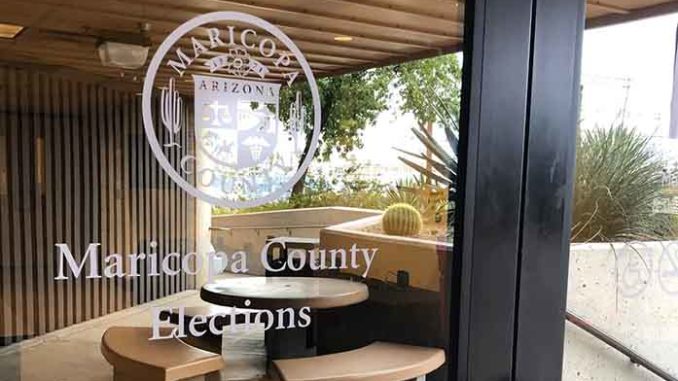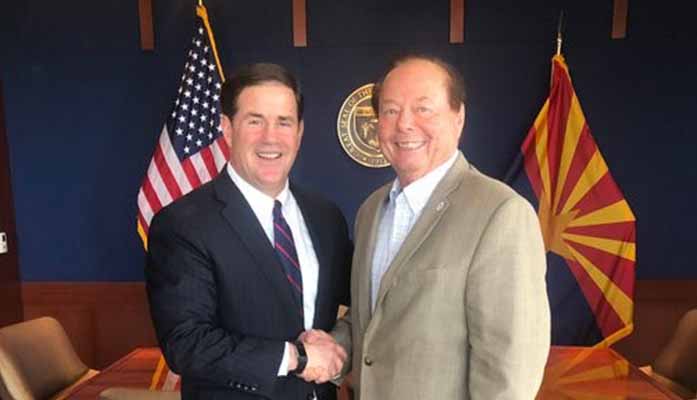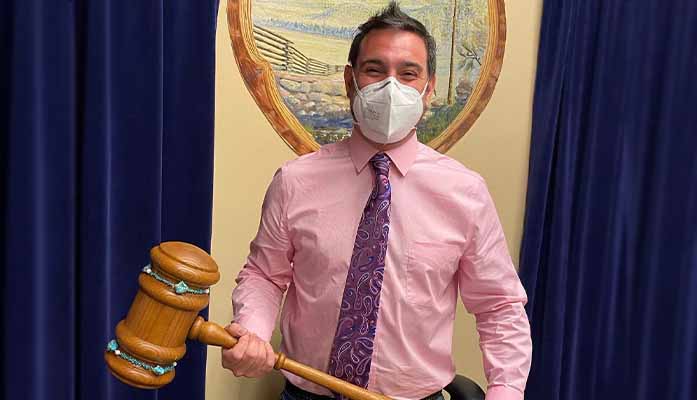
by Terri Jo Neff | Sep 23, 2021 | News
By Terri Jo Neff |
The fiery Aug. 15 explosion of a Kinder Morgan natural gas pipeline which killed two members of Coolidge family and severely burned another ejected a 46-foot section of the pipeline and left a massive crater, according to a preliminary report issued Wednesday by the National Transportation Safety Board.
The rupture of the 30-inch diameter transmission pipeline, known as Line 2000, occurred around 5:30 a.m., sending the ejected pipeline nearly 130 feet away into a field. The subsequent fireball destroyed the home of Luiz and Rosalita Alvarez and was visible for miles, including Casa Grande.
Emergency responders found Luiz and the couple’s 14-year-old daughter Valeria deceased in the house. Rosalita was found nearby with multiple injuries.
According to the report, it took Kinder Morgan personnel one hour to locate and manually shut off the pipeline’s nearest downstream valve. The fire, however, was not extinguished until shortly after 8 a.m. when the nearest upstream valve was finally isolated, the report states.
The investigation to date found that Line 2000 was installed in 1985 to transport crude oil. It was converted for the transmission of natural gas around 2005 when operated by El Paso Natural Gas. Houston-based Kinder Morgan acquired the line in 2012.
The continuing investigation will focus on metallurgical analysis and testing of the ruptured pipeline as well as adjacent sections of pipe which were not damaged. In addition, investigators will look into causal factors and pipeline safety.
Assisting NTSB in this matter are Kinder Morgan, the U.S. Department of Transportation’s Pipeline and Hazardous Materials Safety Administration, the Arizona Corporation Commission, the Pinal County Fire Investigation Taskforce, and the Coolidge Police Department.
The NTSB is an independent federal agency responsible for determining the probable cause for pipeline incidents, as well as civil aviation, railroad, highway, and marine accidents. NTSB spokesman Peter Knudson has said a final report about the incident could take 12 to 24 months to complete.

by Corinne Murdock | Sep 22, 2021 | News
By Corinne Murdock |
Maricopa County Supervisor Steve Chucri resigned after admitting in a leaked audio recording that Maricopa County election officials privately shared their constituents’ concerns over the 2020 election. Specifically, Chucri said he and the other election officials doubted the validity of their hand-count audit, as well as the security of Dominion Voting Machines.
According to Chucri, other board members reportedly knew the county audit wasn’t sufficient, but didn’t want to conduct a full-scale audit because they feared they’d actually lost their races. Instead, the county went ahead with an audit of only two percent of the vote. This totaled around 47,000 ballots out of nearly 2.1 million. With that, the board claimed that the sampling was sufficient to prove election integrity.
In another recording, Chucri questioned whether Dominion’s software had serious security issues. He said it was a “screw up” for Arizona to use Dominion after Texas rejected them due to critical security concerns.
According to Chucri, County Recorder Stephen Richer agreed with those concerns. However, Richer has asserted publicly that he’s never doubted the validity of Dominion’s election equipment.
Richer fired shots at Dominion doubters as recently as Tuesday afternoon. He remarked on a topic trending on Twitter at the time, “Dominion.”
“The world is learning it was all a lie done at the expense of a few private, job-producing, for-profit companies (something I thought we celebrated) and individuals who did nothing wrong,” wrote Richer. “Fortunately, @dominionvoting is going to bankrupt some liars as a result.”
After the audio recordings were leaked that depicted Richer as privately sharing county concerns over the Dominion software, he deleted the tweet.
In a letter explaining his resignation, Chucri chalked his remarks up to “turbulent times” and emphasized that they weren’t indicative of any wrongdoing or cover-up by the county regarding the 2020 election. His resignation will be effective November 5.
Unfortunately, the political landscape changed for the worse this year. The environment is wrought with toxicity – and all civility and decorum no longer seem to have a place. The fixation with the 2020 election results and aftermath have gotten out of control. In recent days it has come to light that I was secretly recorded in conversations regarding differences with some of my colleagues about an audit of the 2020 election. The comments I made were during a very turbulent time. My colleagues have every right to be both angry and disappointed with me. I should not have made such statements and offer my colleagues heartfelt apologies.
I do not want to perpetuate the very problem I ran to eliminate several years ago. While I have had my differences with my colleagues, I have known them to be good, honorable and ethical men. The picture some individuals are trying to paint about a cover-up, scam and other nonsense about my colleagues and myself is simply false. There was no cover-up, the election was not stolen. Biden won.
The leaked audio came from a March conversation between Chucri and We the People AZ Alliance, an activist election integrity group. Gateway Pundit obtained the audio recording. In it, Chucri admitted that those too concerned for their races to speak out against the audit were fellow supervisors Jack Sellers and Clint Hickman.
“[Hickman] wanted to have a conversation about an audit,” explained Chucri. “He just didn’t have the guts to do that at the end of last year, after I’d been asking for something.”
The woman asked if Hickman had his feelings hurt. Chucri said yes. He said it’s “just politics,” and agreed with the woman that Hickman needed to “suck it up.” Chucri said he regretted believing other supervisors when they claimed they were only capable of auditing two percent of the votes.
“This is a blood sport. [He said] I’m not going to kiss your a**, I’m not going to suck up for your vote – I want to earn your vote,” said Chucri. “Whereas those guys want to suck up and kiss up for your vote, and my biggest mistake […] was that I should’ve never believed what I was being told about ‘We couldn’t do more than two percent of an audit before we certified the election.’”
The election results for Chucri’s fellow board members support his remarks.
Sellers barely won his election – he received .08 percent more of the vote than his Democratic opponent, Deedra Abboud.
Chucri won comfortably, earning nearly 19 percent more of the vote than his opponent, Democrat Jevin Hodges. As did Hickman – he won by over 16 percent.
Although Supervisor Bill Gates’ win wasn’t as close as either Sellers’, his opponent only lost by less than two percent of the vote.
Chucri went on to say that he should’ve listened to Congressman Andy Biggs (R-AZ-05) about that matter. Chucri admitted the county knew that they could’ve audited any percentage of the vote they desired.
“My biggest mistake was listening to that. I should’ve listened to Andy Biggs and I think even Brnovich said you could do 30 percent, you could do 60 percent,” said Chucri. “They went and screwed up there because I didn’t know about it until it was too late.”
Neither Hickman or Sellers responded to inquiries from AZ Free News by press time.
Maricopa County asserted in May that their audits were extensive enough to be considered accurate. They included a thread of 23 tweets with evidence that the Senate audit wasn’t being conducted with the protocols or professionalism of a true audit. Cyber Ninjas is the company contracted by the Senate to conduct the audit.
“Our elections were run w/ integrity, the results certified by the county & state were accurate, & the 2 independent audits conducted by the County are the true final word on the subject,” stated the county. “We know auditing. The Senate Cyber Ninja audit is not a real audit. #azsenateaudit[.]”
https://twitter.com/maricopacounty/status/1393273947513266177
Secretary of State Katie Hobbs retweeted the statement in agreement.
“Important thread from @maricopacounty,” wrote Hobbs.
https://twitter.com/katiehobbs/status/1393301623229882371
The Senate confirmed that their audit report of the Maricopa County elections will be published on Friday.
Corinne Murdock is a reporter for AZ Free News. Follow her latest on Twitter, or email tips to corinne@azfreenews.com.

by Corinne Murdock | Sep 22, 2021 | News
By Corinne Murdock |
A Department of Health and Human Services (HHS) whistleblower leaked statements from fellow HHS professionals admitting their concerns over the safety and efficacy of the COVID-19 vaccine and current protocols for treatment of infected patients. The whistleblower, Jodi O’Malley, is an HHS nurse at the Phoenix Indian Medical Center who reached out to the nonprofit journalist enterprise, Project Veritas.
O’Malley told Project Veritas in a sit-down interview that she felt compelled to come forward because more patients were coming in with adverse vaccine reactions, yet the government wasn’t reporting them. One of the biggest incentives for O’Malley to speak out was when her coworker passed away after experiencing complications with the vaccine.
One of the officials on video, HHS emergency room doctor Maria Gonzales, expressed frustration with the government’s transparency over the COVID-19 vaccine causing significant numbers of myocarditis cases.
“The government doesn’t want to show that the darn vaccine is full of s***,” said Gonzales.
Gonzales also claimed that the government was hiding the reports of adverse side effects from the vaccine. Gonzales made these remarks in response to O’Malley describing to her a case of a patient experiencing shortness of breath after receiving his second dose of the COVID-19 vaccine, which was later diagnosed as congestive heart failure. The patient’s elevated BNP, D-Dimer, ALT, liver enzymes, PT-INR levels all were indicative of this diagnosis, according to O’Malley and Gonzales in the video.
“All this is bulls***. Now, [the patient] probably [has] myocarditis due to the vaccine. But now, [the government is] not going to blame the vaccine,” responded Gonzales. “[Government officials] are not reporting [adverse COVID vaccine side effects] because they want to shove it under the mat.”
In the sit-down interview with Project Veritas, O’Malley claimed that the patient’s adverse reaction was never reported.
In another clip, Gonzales asserted that health care providers aren’t doing antibody testing on those who’ve been infected.
Another HHS official, a nurse named Deanna Paris, revealed in a separate clip that current protocol for treating COVID-19 patients isn’t adequate. She expressed concern that it was causing people to suffer and possibly die.
“It’s a shame [the government is] not treating people [with COVID] like they’re supposed to, like they should. I think they want people to die,” remarked Paris.
Another clip submitted by O’Malley depicted her conversation with a pharmacist who explained that they weren’t allowed to have ivermectin at their facility. Remdesivir is the only FDA-approved treatment for COVID-19. The FDA doesn’t approve the use of ivermectin to treat COVID-19; they say it hasn’t proven to be safe or effective.
Read our report on the history, cost, and controversy of remdesivir.
Paris also told O’Malley that she’d seen “a lot” of patients who’d experienced adverse reactions following vaccination. Health care professionals are required by the FDA to submit reports to the HHS Vaccine Adverse Event Reporting System (VAERS) concerning emergency use authorization (EUA) vaccines. Yet, Paris said officials haven’t been submitting those reports because they take too long to create.
“Nobody [is writing up these reports] because it takes over a half an hour to write the damn thing,” stated Paris.
To Project Veritas, O’Malley explained that the method for documenting the safety and efficacy of the vaccine inherently relies on individuals to contribute information to the system.
“What the responsibility of everyone is, is to gather that data and report it,” explained O’Malley. “If we are not gathering that data and reporting it, then how are we going to say that this is safe and approved for use?”
O’Malley stated further that the vaccine hasn’t been effective in preventing COVID-19. Rather, she reported seeing “dozens” of patients with adverse vaccine reactions.
One of the youngest patients O’Malley recounted was only 15 and experiencing blood clots. According to O’Malley, the other health care professionals couldn’t understand why the patient was having that issue. However, O’Malley believed the child’s condition was due to the vaccine. The young patient had just received their first dose several weeks earlier, and was otherwise perfectly healthy.
Project Veritas asked if O’Malley feared retaliation from the government or her employers. O’Malley said yes, but she’s not entirely afraid because of her faith in God.
“I wouldn’t necessarily say I’m afraid because my faith lies in God and not man. This is evil at the highest level. You have the FDA, you have the CDC, that are both supposed to be protecting us,” said O’Malley. “At the end of the day, it’s about your health, and you can never get that back, and about your freedom, and about living in a peaceful society, and I’m like, ‘no.’ No. This is the hill that I will die on.”
Watch the entire whistleblower video from Project Veritas here.
Corinne Murdock is a reporter for AZ Free News. Follow her latest on Twitter, or email tips to corinne@azfreenews.com.

by Terri Jo Neff | Sep 21, 2021 | News
By Terri Jo Neff |
Longtime Republican state lawmaker Frank Pratt died Tuesday after a long illness. He was 79.
“Frank Pratt did it all – public servant, business owner, rancher, farmer and family man,” said Gov. Doug Ducey, who ordered flags at all state buildings lowered to half-half on Wednesday to honor the Florence native. “He was one of the good guys, and we’re lucky he called Arizona home.”
Pratt, who lived in Casa Grande, was first elected to the Arizona House of Representatives in November 2008 to serve the citizens of what was then Legislative District 23. After district boundaries were redrawn, Pratt went on to win a House seat in November 2012 of what is now Legislative District 8 across parts of Gila and Pinal counties.
In 2016, Pratt handily beat his Democratic Party opponent to serve LD8 as state senator. Then last November, he won election to return to the House.
Pratt earned extra admiration from his fellow Republican caucus members earlier this year for the dedication he showed during the legislative session, participating daily in House business despite his illness.
“The honor, integrity, and high ethic by which he conducted himself in his service is incomparable,” House Speaker Rusty Bowers said Tuesday in announcing Pratt’s passing. “He loved what he did and wouldn’t let anything stop him from doing it. He never quit.”
Pratt chaired a variety of committees at the Legislature, including the House Judiciary, Senate Transportation and Technology, and the House Energy, Environment and Natural Resources. He was named Legislator of the Year by the Arizona Chamber of Commerce in 2010, and he enjoyed the support of groups like the National Rifle Association and Fraternal Order of Police over the years.
Among those issuing condolences is the Home Builders Association, which called Pratt “a true statesman who looked out for the interests of Pinal County and above all this great state.” The Greater Phoenix Chamber also weighed in, noting Pratt’s “demeanor, leadership and friendship will be sorely missed at the Capitol.”
A statement from the Arizona Lodging & Tourism Association recalled Rep. Pratt’s love for his community and all of Arizona. “We are incredibly grateful for his service and leadership,” the group tweeted. “Our thoughts and prayers are with his wife Janice and his family.”
Sen. T.J. Shope, who served LD8 with Pratt, tweeted that everyone is better off because of his friend’s hard work on behalf of Arizonans.
“Whether it was on his ranch or farm, his successful business, or in the Legislature, he conducted himself with the type of honor & dignity we should all aspire to,” Shope said.
Pratt’s term runs through the end of 2023. In the coming days, the Arizona GOP chairperson will provide formal notice of the vacancy to all elected Republican precinct committeemen (PC) of the Pinal County portion of LD8 where Pratt lived.
Those PCs will have 21 days to nominate three Republican electors who meet the statutory requirements for the seat and who reside in the LD8 area of Pinal County. The Pinal County Board of Supervisors will appoint one of those nominees to fill the remainder of Pratt’s term.

by Corinne Murdock | Sep 21, 2021 | News
By Corinne Murdock |
Flagstaff Mayor Paul Deasy tweeted the “WTF” acronym on Saturday to inform visitors they needed to mask up. No expletives were used. Rather, the mayor explained the acronym stood for “Welcome To Flagstaff” and encouraged people to “Wear The Face mask.”
https://twitter.com/MayorDeasy/status/1439259836688990210
Though face masks are still required in public transportation and government buildings, even for the fully vaccinated, the citywide mandate ended late May. The public mask mandate was put in place nearly a year prior in June.
AZ Free News inquired with Deasy’s office why the mayor chose to use the controversial acronym to relay COVID-19 safety guidance. They didn’t respond by press time.
This isn’t Deasy’s first foray into posts of this caliber concerning COVID-19. In July, the mayor tweeted what appeared to be a sexual innuendo about the potential connection between COVID-19 infection and lasting erectile dysfunction.
“Don’t let Covid get you down. Get vaccinated!” wrote the mayor.
https://twitter.com/MayorDeasy/status/1413208684457381890
Recently, Deasy’s other social media remarks have caused issues within city governance.
Last month, the Flagstaff City Council expressed their displeasure with Deasy’s public criticisms of them. Deasy had given the council members a 24-hour notice for a special meeting. However, four council members were representing Flagstaff at the League of Cities and Towns Conference in Phoenix and were unable to attend.
Deasy characterized the council members’ absence as willful negligence and a flippant disregard for responsibility and constituents, though the Phoenix conference is an annual affair planned on months in advance.
“Vice Mayor & Councilmembers Salas, Sweet, & Aslan were no-shows to our meeting on Covid wastewater early warning system, so meeting cancelled. Public health & safety of teachers & children should be top priority. Unfortunately, some electeds can’t bother to show up for discussion,” wrote Deasy.
https://twitter.com/MayorDeasy/status/1432879385749581827
Councilman Austin Aslan responded to Deasy with criticism over the mayor’s leadership skills and professionalism.
I can’t just sit on this and not shine a light on it. Here is the Flagstaff mayor on Instagram, repeating, on yet another platform, his baseless smears of fellow Councilmembers. Seriously, I implore you, who does this when they’re in a leadership role? This defamation is so embarrassing it makes me sick to my stomach. I have been one of Flagstaff’s strongest advocates for Covid restrictions, spanning two Councils. How does this mayor sleep at night while deliberately throwing my irrefutable record on pandemic mitigation under the bus? This is so disingenuous. To me, it feels insidious. I was literally driving through a remote portion of I-17 at 6pm on Tuesday. Shame on Paul for blindly insinuating I was at a dinner party. Also: I strongly suspect that both Councilmembers Shimoni and McCarthy are furious that they’re being used as bricks in the mayor’s toxic game, but that’s for them to confirm. Paul Deasy already admitted once this year that he ‘did not befit the honor of his position’ while unfairly impugning a local non-profit director. He truly ought to resign over this. But I’ll leave it there. You be the judge. If you’re troubled too, please share this. These attacks cannot continue in the shadows.
Deasy never issued a statement to responses from council members.
Corinne Murdock is a reporter for AZ Free News. Follow her latest on Twitter, or email tips to corinne@azfreenews.com.

by Corinne Murdock | Sep 21, 2021 | News
By Corinne Murdock |
Following Governor Doug Ducey’s announcement last week that the Biden Administration failed to award bids for forest and wildfire management, the Arizona House announced Monday a new ad hoc committee to undertake that task themselves. Members of the committee include State Representatives Gail Griffin (R-Hereford), Tim Dunn (R-Yuma), Andres Cano (D-Tucson), and Stephanie Stahl Hamilton (D-Tucson), with House Speaker Rusty Bowers (R-Mesa) serving as the chairman.
Ducey’s statement came a day after the Biden Administration suddenly canceled solicitations for the Four Forest Restoration Initiative (4FRI). The 4FRI aimed to restore fire-adaptive ecosystems in the Southwestern Region. The Biden Administration decided that the requirement for the restoration objectives weren’t “reasonably aligned to industry needs.”
In response, Ducey said that the Biden Administration’s decision put Arizonans at risk.
“The federal government’s lack of action is frustrating. The federal mismanagement of our forests poses an ongoing risk,” stated Ducey. “But Arizonans should know that we remain proactive in our pursuit of forest health and disaster prevention. We will continue to work with federal and community partners and safety personnel to protect people, pets and property.”
With this new ad hoc committee, the state government will be able to take action where the federal government won’t at present.
Wildfires have long been a plague for the Grand Canyon State. Arizona contains the key elements for one of these natural disasters to begin: high temperatures and drought that dry out vegetation, combined with low humidity and high winds. With those conditions in place, many things can ignite a wildfire: the sun’s heat, lightning strikes, discarded cigarettes or matches, unattended campfires, or fireworks, for example.
The worst wildfire in recent memory was the 2013 Yarnell Hill Fire, which claimed the lives of 19 firefighters. The high winds caused the fire to shift suddenly, intensifying the fire and cutting off the firefighters’ only escape route.
The tragedy of those Granite Mountain Hotshot firefighters inspired “Hotshots 19,” an annual memorial workout completed nationwide in May consisting of 6 rounds of 30 air squats, 19 power cleans at either 135 pounds for men or 95 pounds for women, 7 strict pull-ups, and a 400 meter run. The firefighters were known as “hotshots” because they were part of a “hotshot crew”: a team of 20 individuals assigned to handle the hottest part of wildfires.
This year, wildfires have occurred near the Juniper Mountains, the Verde River, and the Bradshaw Mountains in Yavapai County (Rock Butte Fires, Rafael Fire, and Tiger Fire); the Gila River and Pinal Mountains in Graham County (Bottom Fire and Pinnacle Fire, respectively); the Santa Rita Mountains in Pima County (Heavy Fire); and the southern border in Pima County (Alamo Fire).
Corinne Murdock is a reporter for AZ Free News. Follow her latest on Twitter, or email tips to corinne@azfreenews.com.






